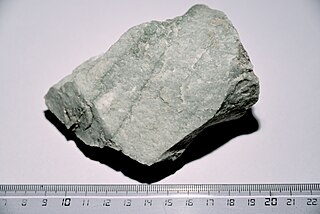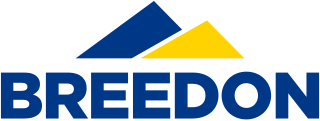Related Research Articles

Marble is a metamorphic rock consisting of carbonate minerals (most commonly calcite (CaCO3) or dolomite (CaMg(CO3)2)) that have recrystallized under the influence of heat and pressure. It has a crystalline texture, and is typically not foliated (layered), although there are exceptions.

Gravel is a loose aggregation of rock fragments. Gravel occurs naturally on Earth as a result of sedimentary and erosive geological processes; it is also produced in large quantities commercially as crushed stone.

A gravel pit is an open-pit mine for the extraction of gravel.

Quartzite is a hard, non-foliated metamorphic rock which was originally pure quartz sandstone. Sandstone is converted into quartzite through heating and pressure usually related to tectonic compression within orogenic belts. Pure quartzite is usually white to grey, though quartzites often occur in various shades of pink and red due to varying amounts of hematite. Other colors, such as yellow, green, blue and orange, are due to other minerals.

CRH plc is an international group of diversified building materials businesses whose headquarters is in Dublin, Ireland. It manufactures and supplies a wide range of products for the construction industry. The group was formed through a 1970 merger of two leading Irish public companies, Cement Limited and Roadstone Limited (1949). CRH's primary listing is on the New York Stock Exchange since 2023, prior to which it was on the London Stock Exchange and on Euronext Dublin.

The Rinker Group was an Australian-headquartered multinational building products company. Before its acquisition by Cemex, it was listed on both the Australian Securities Exchange and the New York Stock Exchange.

Vulcan Materials Company is an American company based in Birmingham, Alabama. It is principally engaged in the production, distribution and sale of construction materials. Vulcan is the largest producer of construction materials, primarily gravel, crushed stone, and sand, and employs approximately 12,000 people at over 400 facilities. Vulcan serves 22 states, the District of Columbia, Mexico, Canada, Bahamas and the U.S. Virgin Islands. Vulcan's innovative Crescent Market project led to construction of a large quarry and deep water seaport on the Yucatán Peninsula of Mexico, just south of Cancun. This quarry supplies Tampa, New Orleans, Houston, and Brownsville, Texas, as well as other Gulf coast seaports, with crushed limestone via large 62,000-ton self-discharging ships.

Construction aggregate, or simply aggregate, is a broad category of coarse- to medium-grained particulate material used in construction, including sand, gravel, crushed stone, slag, recycled concrete and geosynthetic aggregates. Aggregates are the most mined materials in the world. Aggregates are a component of composite materials such as concrete and asphalt; the aggregate serves as reinforcement to add strength to the overall composite material. Due to the relatively high hydraulic conductivity value as compared to most soils, aggregates are widely used in drainage applications such as foundation and French drains, septic drain fields, retaining wall drains, and roadside edge drains. Aggregates are also used as base material under foundations, roads, and railroads. In other words, aggregates are used as a stable foundation or road/rail base with predictable, uniform properties, or as a low-cost extender that binds with more expensive cement or asphalt to form concrete. Although most kinds of aggregate require a form of binding agent, there are types of self-binding aggregate which require no form of binding agent.
Graniterock is an American corporation, founded in 1900 as "Granite Rock", and based in Watsonville, California. It operates in the construction industry providing crushed gravel, sand, concrete, asphalt and paving services.

Crushed stone or angular rock is a form of construction aggregate, typically produced by mining a suitable rock deposit and breaking the removed rock down to the desired size using crushers. It is distinct from naturally occurring gravel, which is produced by natural processes of weathering and erosion and typically has a more rounded shape.
Hydrocarbons are the leading sector in Algeria's mineral industry, which includes diverse but modest production of metals and industrial minerals. In 2006, helium production in Algeria accounted for about 13% of total world output. Hydrocarbons produced in Algeria accounted for about 2.9% of total world natural gas output and about 2.2% of total world crude oil output in 2006. Algeria held about 21% of total world identified resources of helium, 2.5% of total world natural gas reserves, and about 1% of total world crude oil reserves.
As of 2006, the mineral industry of continued to be limited to the production of such construction materials as clay, sand and gravel, and crushed stone for local consumption. Mineral production data continued to be unavailable as of 2006. The Comoros did not play a significant role in the world's production or consumption of minerals.
Production of mineral commodities represents only a small part of the economy of Réunion, although little quantitative information is available. As of 2006, aggregates, cement, and seacoast coral continued to meet local construction needs. Réunion is not a globally significant mineral producer or consumer.
The mineral industry of Seychelles consists mostly of production of such materials as clay, coral, sand, and stone. Seychelles is not a globally significant mineral producer or consumer. In 2006, imports of mineral fuels accounted for about 27% of the value of total imports. That same year, Seychelles was estimated to produce about 210,000 metric tons per year (t/yr) of gravel and crushed stone, 93,000 t/yr of granite, and 8,100 t/yr of sand.

Sand is a granular material composed of finely divided mineral particles. Sand has various compositions but is defined by its grain size. Sand grains are smaller than gravel and coarser than silt. Sand can also refer to a textural class of soil or soil type; i.e., a soil containing more than 85 percent sand-sized particles by mass.
In 2022, the United States was the world’s third-largest producer of raw steel, and the sixth-largest producer of pig iron. The industry produced 29 million metric tons of pig iron and 88 million tons of steel. Most iron and steel in the United States is now made from iron and steel scrap, rather than iron ore. The United States is also a major importer of iron and steel, as well as iron and steel products.
The cement industry in the United States produced 82.8 million tonnes of cement in 2015, worth US$9.8 billion, and was used to manufacture concrete worth about US$50 billion. The US was the world's third-largest producer of cement, after China and India. The US cement industry includes 99 cement mills in 34 states, plus two plants in Puerto Rico. The industry directly employed 10,000 workers in 2015. Ten percent of the cement used in the United States in 2015 was imported.

Breedon Group plc is a British construction materials company which has its headquarters at Breedon on the Hill, Leicestershire, England. The current chairman is Amit Bhatia, son-in-law of Lakshmi Mittal, the billionaire steel magnate who became a Breedon shareholder following the acquisition of Hope Construction Materials. It is listed on the London Stock Exchange and is a constituent of the FTSE 250 Index.

In the Earth sciences, aggregate has three possible meanings.

Oldcastle Materials Inc. is a supplier of asphalt, concrete, and other building materials, and also offers construction and paving services. The Atlanta-based company is a subsidiary of CRH plc, a publicly traded international group of diversified building materials businesses, and has approximately 18,000 employees at 1,200 locations, as of March 2018.
References
- ↑ US Geological Survey, "Sand and gravel (construction)," Mineral Commodity Summary, Jan. 2018.
- ↑ US Geological Survey, "Crushed stone," Mineral Commodity Summary, Jan. 2018.
- ↑ US Geological Survey, "Sand and gravel (construction)," Mineral Commodity Summary, Jan. 2018.
- ↑ US Geological Survey, "Crushed stone," Mineral Commodity Summary, Jan. 2018.
- ↑ US Geological Survey, "Stone, crushed," 2015 Minerals Yearbook, November 2017.
- ↑ US Geological Survey, "Sand and gravel, construction," 2015 Minerals Yearbook, March 2018.
- ↑ US Geological Survey, "Natural aggregates - foundation of America's future," Fact Sheet FS-144-97, Feb. 1999
- ↑ US Geological Survey, "Sand and gravel (construction)," Mineral Commodity Summary, Jan. 2018.
- ↑ US Geological Survey, "Crushed stone," Mineral Commodity Summary, Jan. 2018.